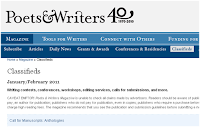AA: In compiling this volume, what impressed you most about the project and the writers?
 |
| Poets & Writers Classifieds/Anthologies |
AW: I don't think I realized at first how significant the project was. Then, I began to get e-mail messages like, "Even if I don't get accepted, this is a very important book you are creating." Also, I got such a positive response when I told more people about it. The theme really meant something to them.
Regarding the writers, I know it sounds strange, but as I lived with the essays and put together the manuscript, I felt like I got to know each of them personally. Their stories became like old friends. Maybe that's because so many of their transitions resonated with me as a woman in one way or another. But what probably stood out for me the most were their distinct voices — each of these women writers had a unique and powerful voice that came through in the prose. I still curl up in a chair with the anthology and enjoy the essays over again which, to me, is a testament to their ability to write.
Tips: Based on Anne's astute observations, writers considering submitting work to an anthology should consider these three key ingredients:
- A resonant theme: Select an anthology with a theme that captivates you. This increases the likelihood that the story you write will captivate others.
- A personal story: Personal in this sense doesn't mean TMI. It means sharing a personal struggle, challenge or experience that can benefit others.
- A distinctive voice: A good anthology is like a good ensemble cast. Each character is discernibly different from the next, yet the production is more than the sum of the parts.
Extra: Anthologies may be the best examples of writing the story after — not before — you read what the publication is looking.
Two good sources for anthologies are Poets & Writers Classifieds/Anthologies and The Writer's Chronicle from the Association of Writers and Writing Programs. But check out each site thoroughly. A listing in a reputable publication doesn't guarantee that the anthology is on the up and up. One place to double-check is the ever-reliable Preditors & Editors Book Publisher and Distributor Listings.
No comments:
Post a Comment